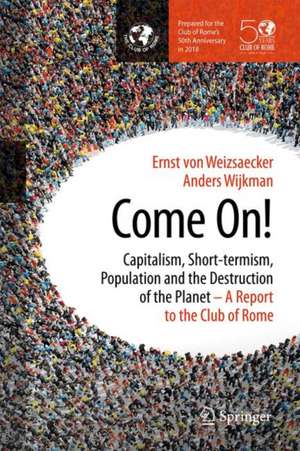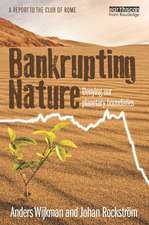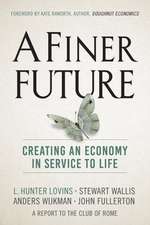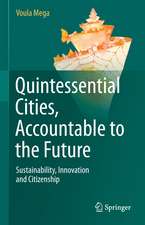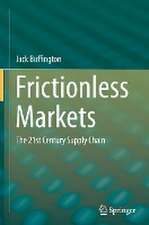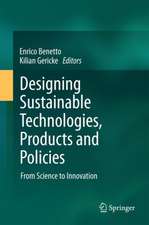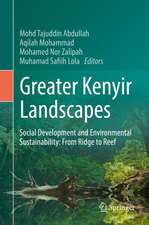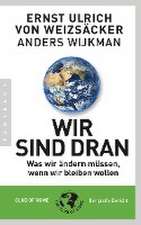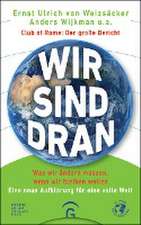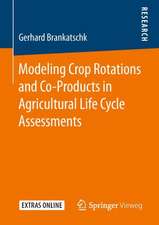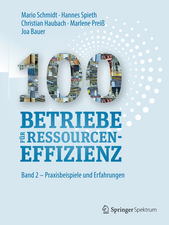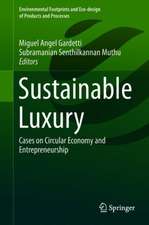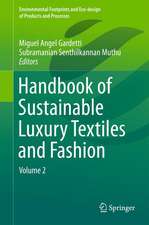Come On!: Capitalism, Short-termism, Population and the Destruction of the Planet
Autor Ernst Ulrich von Weizsäcker, Anders Wijkmanen Limba Engleză Hardback – 14 noi 2017
Current worldwide trends are not sustainable. The Club of Rome’s warnings published in the book Limits to Growth are still valid. Remedies that are acceptable for the great majority tend to make things worse. We seem to be in a philosophical crisis. Pope Francis says it clearly: our common home is in deadly danger. Analyzing the philosophical crisis, the book comes to the conclusion that the world may need a “new enlightenment”; one that is not based solely on doctrine, but instead addresses a balance between humans and nature, as well as a balance between markets and the state, and the short versus long term. To do this we need to leave behind working in ”silos” in favor of a more systemic approach that will require us to rethink the organization of science and education.
However, we have to act now; the world cannot wait until 7.6 billion people have struggled to reach a new enlightenment.
This book is full of optimistic case studies and policy proposals that will lead us back to a trajectory of sustainability. But it is also necessary to address the taboo topic of population increase. Countries with a stable population fare immensely better than those with continued increase.
Finally, we are presenting an optimistic book from the Club of Rome.
However, we have to act now; the world cannot wait until 7.6 billion people have struggled to reach a new enlightenment.
This book is full of optimistic case studies and policy proposals that will lead us back to a trajectory of sustainability. But it is also necessary to address the taboo topic of population increase. Countries with a stable population fare immensely better than those with continued increase.
Finally, we are presenting an optimistic book from the Club of Rome.
| Toate formatele și edițiile | Preț | Express |
|---|---|---|
| Paperback (1) | 186.51 lei 3-5 săpt. | |
| Springer – 22 iun 2018 | 186.51 lei 3-5 săpt. | |
| Hardback (1) | 216.85 lei 3-5 săpt. | |
| Springer – 14 noi 2017 | 216.85 lei 3-5 săpt. |
Preț: 216.85 lei
Nou
Puncte Express: 325
Preț estimativ în valută:
41.49€ • 43.44$ • 34.33£
41.49€ • 43.44$ • 34.33£
Carte disponibilă
Livrare economică 15-29 martie
Preluare comenzi: 021 569.72.76
Specificații
ISBN-13: 9781493974184
ISBN-10: 1493974181
Pagini: 220
Ilustrații: XIV, 220 p. 46 illus., 42 illus. in color.
Dimensiuni: 155 x 235 x 21 mm
Greutate: 0.51 kg
Ediția:1st ed. 2018
Editura: Springer
Colecția Springer
Locul publicării:New York, NY, United States
ISBN-10: 1493974181
Pagini: 220
Ilustrații: XIV, 220 p. 46 illus., 42 illus. in color.
Dimensiuni: 155 x 235 x 21 mm
Greutate: 0.51 kg
Ediția:1st ed. 2018
Editura: Springer
Colecția Springer
Locul publicării:New York, NY, United States
Cuprins
Preface.- Acknowledgments.- Executive Summary.- Part One - C’mon! Don’t tell me the current trends are sustainable! .- 1.1 Introduction: The World in Disarray.- 1.2 Limits to Growth - how relevant was its message?- 1.3 Planetary Boundaries.- 1.4 The Anthropocene .- 1.5 The Climate Challenge.- 1.6 Other disasters ahead.- 1.7 Unsustainable population growth – and urbanization.- 1.8 Unsustainable agriculture and food system.- 1.9 Trade versus environment.- 1.10 The 2030 Agenda – the devil is in implementation.- 1.11 Do we like disruptions? The case of the digital revolution.- 1.12 From Empty World to Full World .- Part Two - C’mon! Don’t stick to outdated philosophies!.- 2.1 Laudato Sí: The Pope raises His voice.- 2.2 Change the Story, Change the Future.- 2.3 1991: „The First Global Revolution“ .- 2.4 Capitalism got arrogant .- 2.5 The failure of the market doctrine .- 2.6 Philosophical errors of the market doctrine.- 2.7 Reductionist philosophy is shallow and inadequate.- 2.8 Gaps between Theory, Education and Social Reality.- 2.9 Tolerance and long-term perspectives.- 2.10 We may need a New Enlightenment.- Part Three Come On! Join us on an exciting journey towards a sustainable world! .- 3.1 A regenerative economy.- 3.2 Development Alternatives.- 3.3 The Blue Economy.- 3.4 Decentralized energy.- 3.5 Some agricultural success stories.- 3.6 Regenerative urbanization: Ecopolis.- 3.7 Climate: Some good news, but bigger challenges.- 3.8 Circular economy requires a new economic logic.- 3.9 Five-fold resource productivity.- 3.10 Healthy disruption.- 3.11 Reform of the financial sector.- 3.12 Reform of the economic set-up.- 3.13 Benign investment.- 3.14 Measuring well-being rather than GDP.- 3.15 Civil Society, Social Capital and Collective Leadership.- 3.16 Global Governance.- 3.17 National level action: China and Bhutan.- 3.18 Education for a sustainable civilization.- Conclusion: We invite readers to ‘come on’.- Index.- Blurbs.
Recenzii
“The new book is essential reading for all of us. … The book offers many positive, practical examples, success stories and opportunities. Many areas of action concern policies at EU level and are of direct relevance to the current policy debate, for example, a move towards a circular economy can help overcome mineral scarcity, significantly lower carbon emissions and increase the number of jobs or regenerative agriculture can stop soil erosion, enhance yields and build carbon in the soil.” (Rod Janssen, energyindemand.com, April, 2018)
Notă biografică
Ernst von Weizsäcker, Emmendingen, Germany
Anders Wijkman, Stockholm, Sweden
Textul de pe ultima copertă
Current worldwide trends are not sustainable. The Club of Rome’s warnings published in the book
Limits to Growth are still valid. Remedies that are acceptable for the great majority tend to make things worse. We seem to be in a philosophical crisis. Pope Francis says it clearly: our common home is in deadly danger. Analyzing the philosophical crisis, the book comes to the conclusion that the world may need a “new enlightenment”; one that is not based solely on doctrine, but instead addresses a balance between humans and nature, as well as a balance between markets and the state, and the short versus long term. To do this we need to leave behind working in ”silos” in favor of a more systemic approach that will require us to rethink the organization of science and education.
However, we have to act now; the world cannot wait until 7.6 billion people have struggled to reach a new enlightenment.
This book is full of optimistic case studies and policy proposals that will lead us back to a trajectory of sustainability. But it is also necessary to address the taboo topic of population increase. Countries with a stable population fare immensely better than those with continued increase.
Finally, we are presenting an optimistic book from the Club of Rome.
Limits to Growth are still valid. Remedies that are acceptable for the great majority tend to make things worse. We seem to be in a philosophical crisis. Pope Francis says it clearly: our common home is in deadly danger. Analyzing the philosophical crisis, the book comes to the conclusion that the world may need a “new enlightenment”; one that is not based solely on doctrine, but instead addresses a balance between humans and nature, as well as a balance between markets and the state, and the short versus long term. To do this we need to leave behind working in ”silos” in favor of a more systemic approach that will require us to rethink the organization of science and education.
However, we have to act now; the world cannot wait until 7.6 billion people have struggled to reach a new enlightenment.
This book is full of optimistic case studies and policy proposals that will lead us back to a trajectory of sustainability. But it is also necessary to address the taboo topic of population increase. Countries with a stable population fare immensely better than those with continued increase.
Finally, we are presenting an optimistic book from the Club of Rome.
Caracteristici
Optimistic assessment of global environmental crisis Climate policy despite Trump Smashing new Report from the Club of Rome
